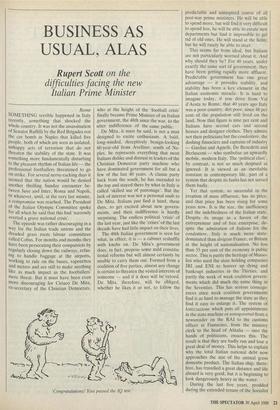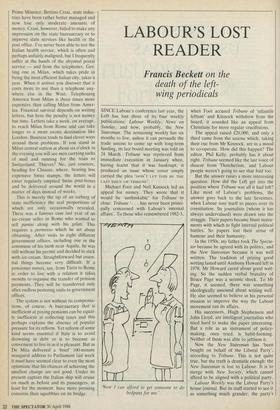BUSINESS AS USUAL, ALAS
Rupert Scott on the
difficulties facing the new Italian Prime Minister
Rome SOMETHING terrible happened in Italy recently, something that shocked the whole country. It was not the assassination of Senator Ruffilli by the Red Brigades nor the car bomb in Naples that killed five people, both of which are seen as isolated, unhappy acts of terrorism that do not threaten the stability of the state. It was something more fundamentally disturbing to the pleasant rhythm of Italian life — the professional footballers threatened to go on strike. For several nerve-racking days it seemed that the nation would be denied another thrilling Sunday encounter be- tween Juve and Inter, Roma and Napoli, Or whatever, until, at the very last minute, a compromise was reached. The President of the Italian Olympic Committee spoke for all when he said that this had 'narrowly averted a grave national crisis'. The episode was rather discouraging in a way for the Italian trade unions and the dreaded grass roots labour committees called Cobas. For months and months they have been persecuting their compatriots by regularly closing down the railways, refus- ing to handle baggage at the airports, working to rule on the buses, vaporettos and metros and are still to make anything like as much impact as the footballers' mere threat. But it must have been even more discouraging for Ciriaco De Mita, ex-secretary of the Christian Democrats,
who at the height of the 'football crisis' finally became Prime Minister of an Italian government, the 48th since the war, to the utter indifference of the same public. De Mita, it must be said, is not a man designed to excite enthusiasm. A bald, long-winded, deceptively benign-looking 60-year-old from Avellino, south of Na- ples, he represents everything that most Italians dislike and distrust in leaders of the Christian Democrat party machine who have dominated government for all but a few of the last 40 years. A classic party hack from the south, he has ascended to the top and stayed there by what in Italy is called 'skilled use of patronage'. But the lack of interest was not a personal snub to De Mita. Italians just find it hard, these days, to get excited about new govern- ments, and their indifference is hardly surprising. The endless political 'crisis' of the last year, just like the 'crises' of the last decade have had little impact on their lives.
The 48th Italian government is seen for what, in effect, it is — a cabinet reshuffle with knobs on. De Ivlita's government does, in fact, propose some mild constitu- tional reforms but will almost certainly be unable to carry them out. Formed from a coalition of five parties, almost any change is certain to threaten the vested interests of someone — and if it does will be vetoed. De Mita, therefore, will be obliged, whether he likes it or not, to follow the 'Congratulations! You passed the IQ test.' predictable and uninspired course of all post-war prime ministers. He will be able to spend more, but will find it very difficult to spend less, he will be able to create new departments- but find it impossible to get rid of old ones. He will stand at the helm; but he will rarely be able to steer.
This seems far from ideal, but Italians are not particularly worried about it. And why should they be? For 40 years, under exactly the same sort of government, they have been getting rapidly more affluent. Predictable government has one great advantage — it provides stability, and stability has been a key element in the Italian economic miracle. It is hard to imagine today, if you drive from Val d'Aosta to Rome, that 40 years ago Italy was a poor country; dirt poor, since 48 per cent of the population still lived on the land. Now that figure is nine per cent and Italians have second cars and second houses and designer clothes. They admire not their politicians but the condottiere, the dashing financiers and captains of industry — Gardini and Agnelli, De Benedetti and Berlusconi — who symbolise an upwardly mobile, modern Italy. The 'political class', by contrast, is not so much despised as ignored. It is viewed as an inevitable constant in contemporary life, part of a system that despite its faults has not served them badly.
Yet that system, so successful in the creation of mass affluence, has its price, and that price has been rising for some years now. It is the size, the inefficiency and the indebtedness of the Italian state. Despite its image as a haven of the entrepreneur and of free enterprise, de- spite the admiration of Italians for the condottiere, Italy is much more state- dominated than dirigiste France, or Britain at the height of nationalisation. No less than 55 per cent of the economy is public sector. This is partly the heritage of Musso- lini who used the state holding companies IRI and ENI to hoover up dying and bankrupt industries in the Thirties, and partly the work of weak coalition govern- ments which did much the same thing in the Seventies. This has serious consequ- ences since weak coalition governments find it as hard to manage the state as they find it easy to enlarge it. The system of lottizzazione which puts all appointments in the state machine or sottogoverno from a newsreader on the RAI to the customs officer at Fiumicino, from the ministry clerk to the head of Alitalia — into the hands of politicians, ensures this. The result is that they are badly run and lose a great deal of money. This helps to explain why the total Italian national debt now approaches the size of the annual gross domestic product. The Italian ship, there- fore, has travelled a great distance and life aboard is very good, but it is beginning to look dangerously heavy in the water.
During the last five years, prodded during the extended tenure of the Socialist Prime Minister, Bettino Craxi, state indus- tries have been rather better managed and now lose only moderate amounts of money. Craxi, however, failed to make any impression on the state bureaucracy or to improve state services like health or the post office. I've never been able to test the Italian health service, which is often and perhaps unfairly maligned, but I frequently suffer at the hands of the abysmal postal service — and from the telephones. Get- ting one in Milan, which takes pride in being the most efficient Italian city, takes a year. When it arrives you discover that it costs more to use than a telephone any- where else in the West. Telephoning America from Milan is three times more expensive than calling Milan from Amer- ica. Financial survival depends on writing letters, but here the penalty is not money but time. Letters take a week, on average, to reach Milan from Rome and can take longer to a more exotic destination like London. Business tends to find clever ways around these problems. If you stand in Milan central station at about six o'clock in the evening you will see men carrying sacks of mail and running for the train to Switzerland. Thieves? No, just couriers, heading for Chiasso, where, bearing less expensive Swiss stamps, the letters will enter regularly emptied Swiss post-boxes and be delivered around the world in a matter of days instead of weeks.
This is merely the tip of an iceberg of state inefficiency the real proportions of which are only occasionally revealed. There was a famous case last year of an ice-cream seller in Rome who wanted to sell panini along with his gelati. This requires a permesso which he set about obtaining. After visits to eight different government offices, including one in the commune of his birth near Aquila, he was still without his permit and decided to stick with ice-cream. Straightforward but essen- tial things become very difficult. If a pensioner moves, say, from Turin to Rome in order to live with a relation it takes months to organise the transfer of pension payments. They will be transferred only after endless pestering visits to government offices.
The system is not without its compensa- tions, of course. A bureaucracy that is inefficient at paying pensions can be equal- ly inefficient at collecting taxes and this perhaps explains the absence of popular pressure for its reform. Yet reform of some kind seems essential if Italy is to avoid drowning in debt or is to become as convenient to live in as it is pleasant. But as De Mita delivered a 'brief 100-minute inaugural address to Parliament last week it must have seemed clear to even the most optimistic that his chances of achieving the smallest change are not good. Under its present captain the Italian ship will cruise on much as before and its passengers, at least for the moment, have more pressing concerns than squabbles on its bridge.



























































 Previous page
Previous page